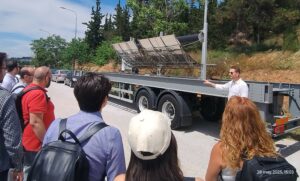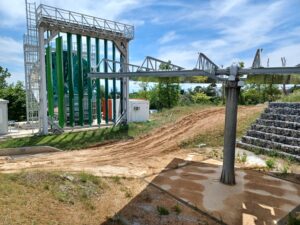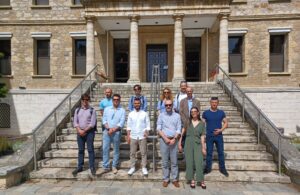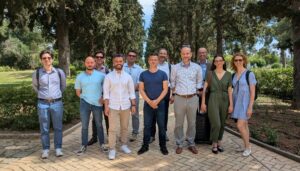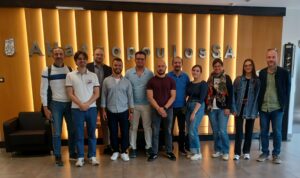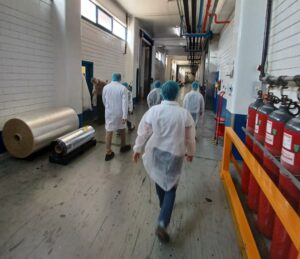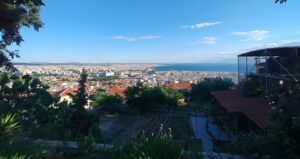| On May 27 and 28 2025, Thessaloniki hosted a key milestone event of the Interreg Euro-MED GREENSMARTMED project: the Capacity Building Transnational Cooperation Event, entitled “The Green Innovation in the Agrifood Sector.” Organized by CERTH – Centre for Research and Technology Hellas, with the support of the Regional Development Fund of Western Macedonia (RDF), the event brought together a rich network of Mediterranean stakeholders to explore strategies for accelerating the green transition in the agrifood sector.
The first day of the event was marked by the project’s 3rd Transnational Meeting,
The Transnational Event of the second day, that was held in Thermiat the CERTH’s campus, offered a unique occasion to assess progress in testing the GREENSMARTMED methodology and toolkit across participating regions, with a focus on the agrifood sector, one of the project’s five priority sectors, alongside textile, mobility & batteries, machinery, and plastics. Structured around three thematic panels and interactive living lab discussions, the event covered a broad spectrum of green innovation, entrepreneurship, and technological transition in agrifood systems. The panels brought together project partners, institutional actors, research organizations, SMEs, and innovation clusters. Panel 1 – Reducing the Environmental Footprint in the Agrifood Sector & Carbon Farming
– George Galanis, i-BEC, presenting research on climate-smart agrifood systems, with a focus on the carbon farming methodology implemented in the field, as well as the process followed for the generation of carbon credits. – George Papapostolou, Reframe.food, presenting the CARBONICA project, focusing on the business aspect of carbon farming. – Marcello Siena, Ali-Big Industria Alimentare S.r.l., discussing practical applications and challenges faced by SMEs in sustainable production according to his company’s mission to promote biodynamic solutions. – Pavlos Polytsakis, AG-Cluster, offering insights from the Greek agri-innovation cluster for the development of a new Carbon Footprint assessment and mitigation strategies for peach and kiwi production in the Imathia Region (Greece).
The session facilitated a robust exchange of regional and cross-sectoral practices, emphasizing the role of data, collaboration, and local ecosystems in reducing agrifood’s ecological footprint.
Panel 2 – Use of Sustainable Technologies in the Agrifood Sector
– Alejandro Alcaraz, Elettrotecnica ROLD S.r.l., who underlined the importance of Raising Awareness on Food Waste, by leveraging the tool of Machine Learning, as through the Revelio project. – Davide Bonassi, Feelera S.r.l. SB, who presented the Feelera cloud platform created to transform traceability in the Agrifood sector into a transparent communication. – Dimitrios Moustakis, Innovation & Impact Hub of American Farm School of Thessaloniki/ BBioNets, who described the BBioNets project’s goal of advancing bioeconomy through Local Innovation. – Haris Paliogiannis, MIO-ECSDE, who presented the work of the three thematic agrifood projects under the ISE Mission: Carbon Farming MED, Clepsydra and OliveOilMedNet. – Ioannis Mourtzinos, AgrofoodRnD, who explained how edible films can play as carriers for bioactive ingredients. – Maurizio Notarfonso, Agri-Food Supply Chain Innovation Lab of ENEA, who presented ENEA’s solutions in the framework of innovation trajectories for agrifood, with a focus on the METROFOOD-PP project. – Nikolaos Christodoulou, ARTEMIS Laboratory (CPERI/CERTH) – SolarHub, who provided insights into the potential of solar-aided processes for leveraging agrifood residual biomass. – Nikos Kanopoulos, BriteSolar, who presented the company’s “AgroPower” concept for the use of innovative Solar glass technology for agrivoltaics. – Simone Franceschetto, Politecnico di Milano, who described his university’s approach to traceability in food supply chain. – Theodoros Tsamourtzis, Atecluster, who presented the cluster’s goal to become the growth catalyst and reference point of the Agrifood sector in Greece and abroad.
Panel 3 – Strengthening Agri-Food Entrepreneurship: Financing, Investments, Innovation and Technology Transfer
– Nikos Takas, Northern Greece Investment Fund, who presented the growth equity venture capital fund investing in fast growing exporting businesses and startups in Greece, related to the agrifood sector. – Evangelia Kazakli, KEPA – Hellenic Design Center, who described the role of the Greek organization as a point of reference in the regional development, as one of the country’s major providers of entrepreneurship and business support. – Konstantinos Papadakis, AgroID SCE, who explained how to help revive rural life through social and environmental innovation, as well as development of rural entrepreneurship according to a bottom-up approach. – Rangel Matanski, National Association of Young Farmers – Bulgaria, who introduced the local, regional and national bottom-up levels of cooperation among farmers and other stakeholders in Bulgaria. – Manolis Chatzigiannis, Spira – CERTH’s Technology Transfer Office, who presented its activities, focusing on the exploitation of research results for the benefit of the national economy and the wider society, leading a technology transfer network of International Hellenic University, University of Western Macedonia, University of Macedonia and the Research Center of Hellenic Agricultural Organization DIMITRA. – Maurizio Notarfonso, Agri-Food Supply Chain Innovation Lab of ENEA, who focused on challenges for the agrifood supply chain and links between technological innovation and communication.
Inter-Project Synergies and Field Innovation
To this aim, after the panel sessions, between the afternoon of 28 May and the morning of 29 May, the Event also featured the opportunity for participants to join three site visits:
.
The Thessaloniki event represented a key Mediterranean Momentum for Green Manufacturing. Through cross-sector dialogue, transnational exchange, and regional alignment, it strengthened the collaborative fabric needed to drive sustainable manufacturing transformation across the Euro-Mediterranean space. The participation of diverse stakeholders – from public agencies and universities to SMEs, clusters, and civil society organizations – ensured a multi-actor approach consistent with Interreg Euro-MED’s mission. It also laid strong foundations for the next steps of the GREENSMARTMED journey, with upcoming events planned in Italy and Spain, focusing on further testing and dissemination of the project’s results.
Did you attend our event? Please let us know your opinion!
|

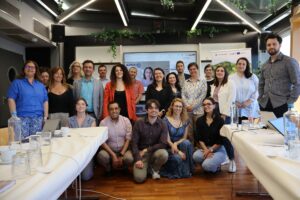 where partners discussed and planned together the next steps of the GREENSMARTMED project, now in its second year of operation, followed by a Networking session, at the Egnatia Palace Hotel premises.
where partners discussed and planned together the next steps of the GREENSMARTMED project, now in its second year of operation, followed by a Networking session, at the Egnatia Palace Hotel premises.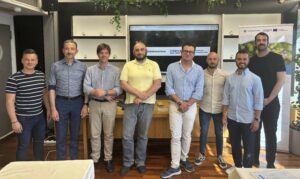 During the networking activities, the invited stakeholders involved in the regional core activities implemented in Italy and Bulgaria (
During the networking activities, the invited stakeholders involved in the regional core activities implemented in Italy and Bulgaria (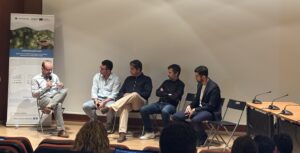 Moderated by Dimitri Chomatidis (CERTH), this panel explored innovative solutions and strategies for carbon farming and reducing the environmental impact of agrifood systems. Panelists included:
Moderated by Dimitri Chomatidis (CERTH), this panel explored innovative solutions and strategies for carbon farming and reducing the environmental impact of agrifood systems. Panelists included: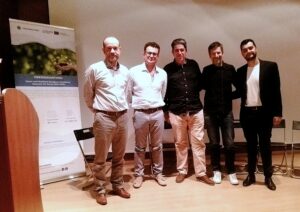
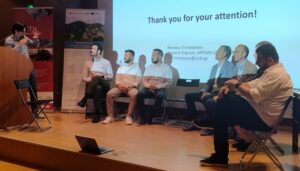 Moderated by Carlo Mondani (AFIL), the vibrant discussion featured:
Moderated by Carlo Mondani (AFIL), the vibrant discussion featured: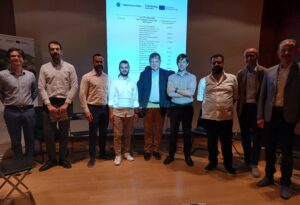 The panel emphasized the importance of integrating clean tech and smart materials into food production, and highlighted barriers and incentives for SMEs to adopt greener technologies.
The panel emphasized the importance of integrating clean tech and smart materials into food production, and highlighted barriers and incentives for SMEs to adopt greener technologies.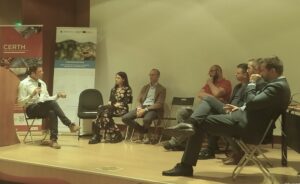 Moderated by Valantis Ketikidis (CERTH), this panel focused on boosting business innovation ecosystems, the panel featured:
Moderated by Valantis Ketikidis (CERTH), this panel focused on boosting business innovation ecosystems, the panel featured: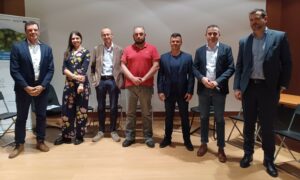 Discussions highlighted the crucial interplay between finance, regional innovation systems, and digital tools for supporting next-generation agri-entrepreneurs.
Discussions highlighted the crucial interplay between finance, regional innovation systems, and digital tools for supporting next-generation agri-entrepreneurs.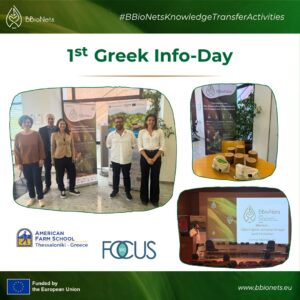 The event also featured a
The event also featured a 